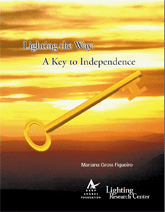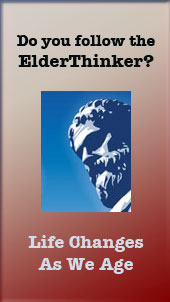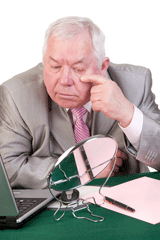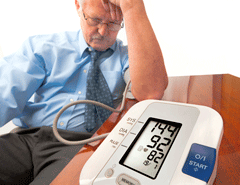
Natural Eye Changes As We Age
Presbyopia
Many things about us change as we grow older, including our eyes. The first thing we might notice is having to hold something further away when we read. This is called presbyopia.
Before the age of forty or so, the natural lens of the eye is very flexible. This flexibility helps the lens focus on objects that are close up or far away. But as we grow older, the lens loses its flexibility and its harder to see up-close objects. If you have presbyopia, you might have to hold an object like a book or a menu farther away to see it clearly.
Seeing In The Dark
As we grow older, the pupil gets smaller so less light reaches the retina. In addition the lens yellows and thickens with age, also impeding the transmission of light. This means that older people need extra lighting and have more trouble seeing when it is dark.
Bright Lights
Our older eyes are slow to adapt to changes in light. Bright lights may require extra blinking and a moment to adjust. If some areas of a room or surface are brighter, it may be harder to see things in the dim spaces. This can make driving a car at night especially challenging.
Colors
The ability to see some colors can gradually diminish as we age. This especially affects the ability to tell the difference between blues and blue-greens. Some medications that older people take can also affect color vision.
Dry Eye Syndrome
Dry eyes happen when tear glands cannot make enough tears or produce poor quality tears. As we get older, our eyes naturally produce less tears. Having laser eye surgery or wearing contact lenses can make the problem worse. Dry eyes are more than just irritating. Your eyes need to stay wet to keep them healthy. Dry eyes will hurt your vision if you let it go for a long time. If you've got mild dry eyes, artificial tears, which can be bought without a prescription, can bring back the moisture your eyes are missing. A humidifier in the home can help if you are in a dry climate. As a last resort, there are surgical procedures that can improve dry eyes.
Tearing
Tearing, or having too many tears, can come from being sensitive to light, wind, or temperature changes. Protecting your eyes by shielding them or wearing sunglasses can sometimes solve the problem. Tearing may also mean that you have a more serious problem, such as an eye infection or a blocked tear duct.
Medications
Some medications can affect our vision. Since we are living longer than ever before, and taking meds much longer, these side-effects are showing up. If you decide to see your doctor about vision problems, a review of your meds might be in order.





